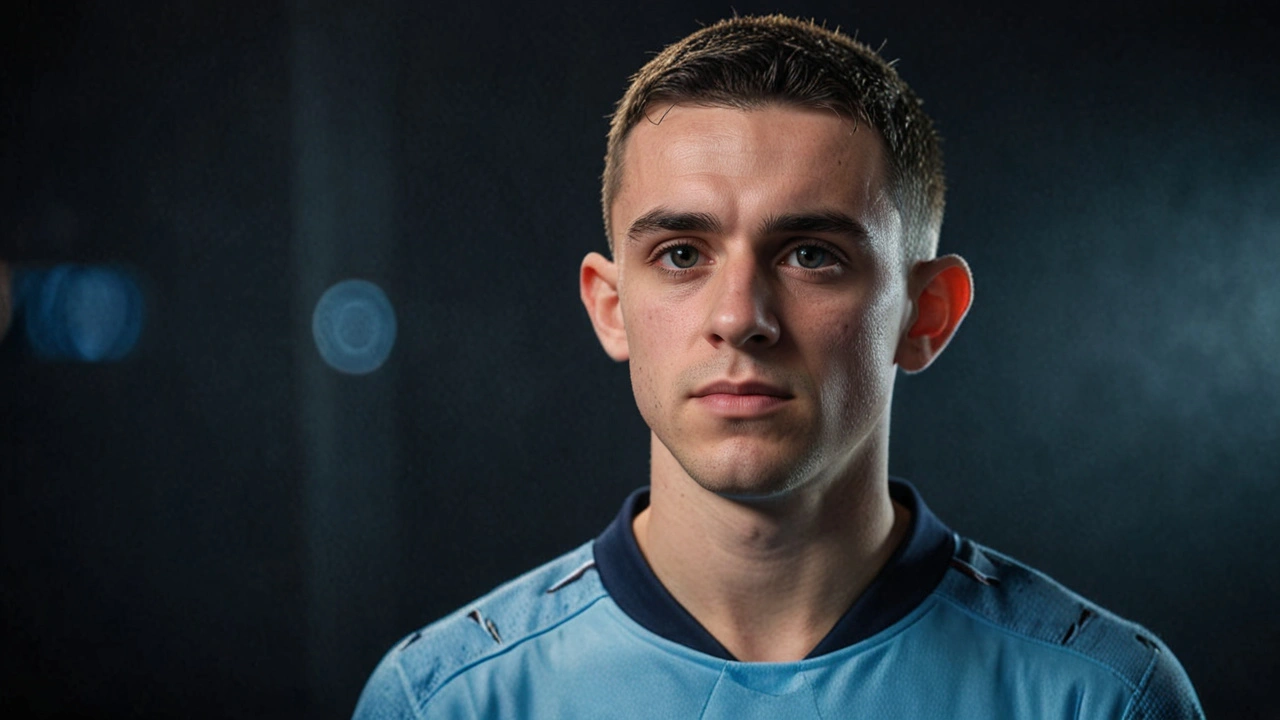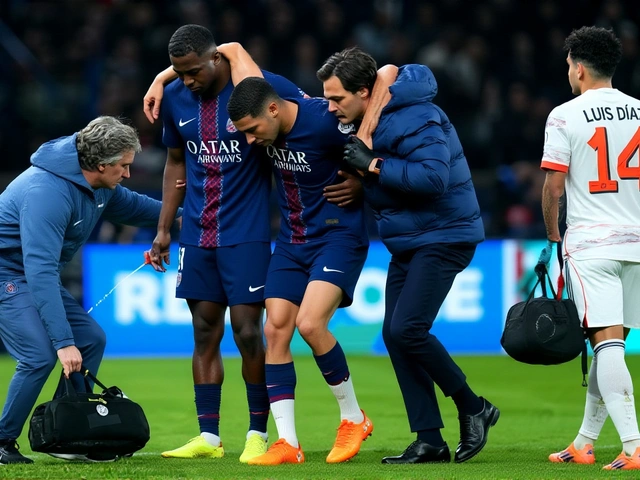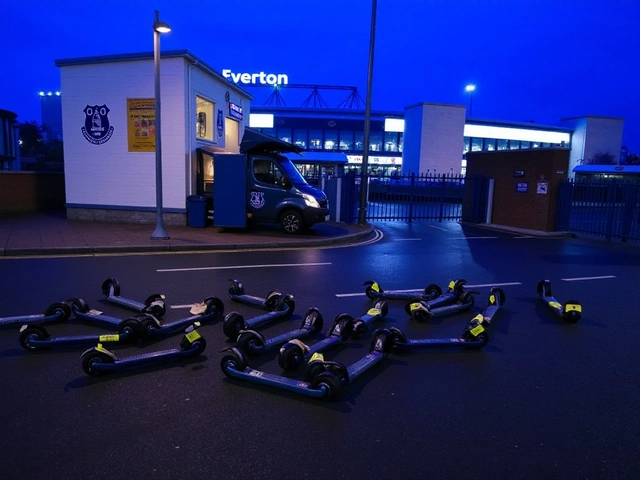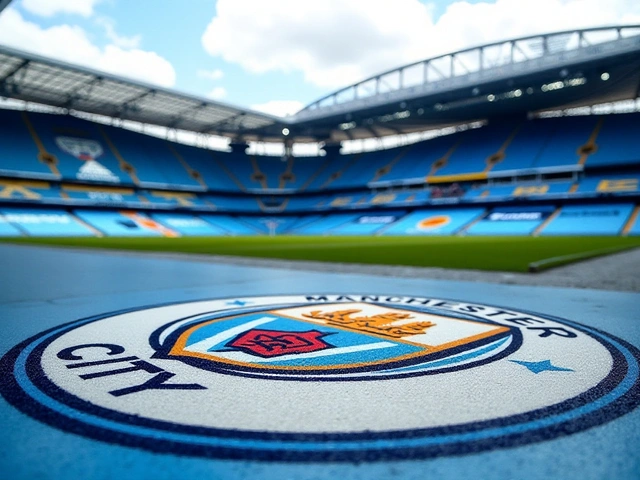Phil Foden, the immensely talented midfielder for Manchester City and England, has a particular hobby that distinguishes him from his peers in the football world. While many footballers might opt for lavish holidays and high-profile engagements during their downtime, Foden prefers the tranquility and solace that fishing offers. This pastime, shared by only a handful of his colleagues, sets Foden apart and highlights a unique aspect of his character that fans might not expect from a top-tier athlete.
In an interview with Manchester City, Foden revealed that 'probably about 95 percent of the football lads don't enjoy' fishing. This statement underscores how unusual it is for someone in his profession to take up this hobby. For Foden, fishing is not just a casual activity but a long-standing family tradition that began when he was just six years old. His father introduced him to fishing, and it quickly became a passion that Foden holds dear to this day.
Foden's fishing trips have led to some impressive catches, including a 130lb Catfish. These trips often take him and his father to lakes around the UK and Spain, providing them with precious moments to bond away from the frenzy and spotlight of professional football. It is this opportunity to connect with his dad and the calming environment that Foden finds so appealing. The rigorous demands of his career make these relaxed moments even more valuable, offering a peaceful counterbalance to the pressures and high energy of professional sports.
This passion for fishing even impacted his professional commitments. For instance, Foden once missed the 2018 Premier League title celebrations for a pre-planned fishing trip with his father. This decision reflects his commitment to his family and their shared interests, over and above the glamorous aspects of his football career. It is this grounding and dedication to personal values that fans find endearing.
Despite his fame and success on the football field, Foden's life off the pitch remains remarkably down-to-earth. He is in a long-term relationship with Rebecca Cooke, and together they have three children. Balancing fatherhood with his demanding career, Foden recently left the England camp ahead of their match against Slovakia to be present for the birth of his third child. He then swiftly returned to Germany to continue with England's international campaign. This quick transition from family responsibilities to professional duties underscores Foden's ability to manage his dual roles effectively.
Foden's choice of hobby says a lot about his character. In a culture that often emphasizes wealth and luxury, his preference for the simple and serene act of fishing is refreshing. It brings a human aspect to his public persona that resonates with fans and offers a stark contrast to the often flashy lifestyles led by many in his profession.
Fishing, for Foden, is more than just catching fish—it's about maintaining a connection to his roots and ensuring quality time with his family. It provides a retreat from the constant demands of being a professional athlete, allowing him space to relax and recharge. Whether he's catching a mammoth catfish or simply enjoying the calm water, Foden's fishing trips are a vital part of his life that keeps him humble and grounded.
In a world where footballers are often seen as living in a bubble of fame and fortune, Foden's love for fishing offers a refreshing narrative. It demonstrates that even those who achieve great success on the global stage can still cherish and prioritize simple, meaningful activities. As he continues to make waves on the football field, fans will undoubtedly appreciate this unique aspect of his life that makes him stand out.
In summary, Phil Foden's passion for fishing is an endearing quality that not only sets him apart from most footballers but also showcases a balance between his professional obligations and personal life. His dedication to family and this tranquil pastime provides a compelling example of how one can remain true to their values and roots, regardless of their success.










Ketan Shah
July 15, 2024 AT 08:42Foden's love for fishing is a neat reminder that elite athletes still crave simple pleasures. Growing up in a fishing family gives him a grounding that many of his peers miss. The calm of a lake can be a perfect antidote to the relentless pressure of Premier League nights. It also shows that sport stars can keep cultural traditions alive, especially in regions where angling is part of the heritage. I think his fans appreciate seeing that human side.
Aryan Pawar
July 19, 2024 AT 23:49Man, that catfish story is pure legend.
Shritam Mohanty
July 24, 2024 AT 14:56Everyone tells us Foden is just another football robot, but the real agenda is hidden. The fact he skipped a title party for a fishing trip is a clear signal they’re trying to distract us from the club’s financial shenanigans. I bet the league is using his hobby as propaganda to hide the corruption brewing behind the scenes.
Anuj Panchal
July 29, 2024 AT 06:02From a performance analytics standpoint, integrating low‑intensity activities like angling can modulate autonomic balance, which in turn optimizes homeostatic recovery cycles for high‑velocity match play. Moreover, the dyadic interaction with his father constitutes a psychosocial buffer, attenuating cortisol spikes associated with elite competition. This biophilic exposure aligns with emerging neuro‑ecological frameworks that advocate for nature‑based interventions in talent development pipelines. Hence, Foden’s practice isn’t just leisure; it’s a strategic component of his periodisation schema.
Prakashchander Bhatt
August 2, 2024 AT 21:09It’s great to see a top‑level player still find joy in something as humble as casting a line. Those moments with family probably keep him centered when the season gets hectic. I hope more athletes take notes and carve out time for simple hobbies. It reminds us all that success doesn’t have to erase the little things we love.
Mala Strahle
August 7, 2024 AT 12:16Reading the biomechanical breakdown of Foden’s fishing routine is surprisingly enlightening, especially when we consider how the repetitive motion of casting mirrors certain kinetic chains employed on the pitch. Each time he reels in, his forearm flexors and rotator cuff engage in a controlled, low‑load contraction that reinforces neuromuscular coordination without the oxidative stress of high‑intensity training. This low‑impact stimulus can serve as an active recovery modality, facilitating micro‑vascular perfusion in muscle groups that are otherwise fatigued after a congested fixture schedule. Moreover, the sensory immersion in natural water bodies provides a multisensory reset, allowing the parasympathetic nervous system to dominate, which is essential for restoring heart‑rate variability and overall mental clarity. When Foden shares a quiet dawn on a Spanish reservoir with his father, the intergenerational dialogue acts as a narrative anchor, rooting his identity beyond the transient acclaim of trophies. Such grounding experiences counteract the identity diffusion that many young prodigies face when their self‑worth becomes entangled with public performance metrics. In the broader context of athlete welfare, Foden’s example underscores the therapeutic potential of integrating traditional pastimes into modern training regimens. By juxtaposing the precision required for a perfect cast with the unpredictability of a football match, he cultivates a mindset that embraces both control and adaptability. The mindful patience demanded by waiting for a bite can translate into heightened composure during high‑pressure moments in a game, where decision‑making speed is paramount. Additionally, the tactile feedback from the tension of a line can sharpen proprioceptive awareness, an often‑overlooked facet of elite motor skill development. It also offers a social conduit; bonding with his father on these expeditions reinforces familial support structures that are vital for emotional resilience. The anecdote about missing the 2018 celebration for a pre‑planned trip signals a deliberate prioritisation of personal values over commercial spectacle, a stance that can inspire teammates to seek balance. From a sports psychology perspective, the act of stepping away from the limelight to focus on a solitary, rhythmic activity can reduce performance anxiety, fostering a more sustainable competitive edge. Finally, the narrative of catching a 130‑lb catfish adds a mythic layer to his personal brand, connecting fans to a relatable, human story rather than a distant, untouchable idol. In sum, Foden’s fishing hobby is a microcosm of holistic athlete development, intertwining physiological recovery, psychological well‑being, and cultural continuity into a single, harmonious practice.
shubham garg
August 12, 2024 AT 03:22Honestly, if we could all find a hobby that takes our mind off the grind like Foden does, the world would be a less stressed place. Casting a line is low key but it teaches patience, something we all need on the pitch and in life. Props to him for putting family first even when the media expects a celebration. Keep reeling in those good vibes.
LEO MOTTA ESCRITOR
August 16, 2024 AT 18:29What strikes me is how Foden turns a simple pastime into a philosophical statement about staying grounded. He reminds us that no matter how many goals you score, the quiet moments with a loved one hold the greatest meaning. It’s a lesson in humility that can inspire anyone chasing big dreams.
Sonia Singh
August 21, 2024 AT 09:36I feel the same – that calm by the water is a gentle nudge to remember who we are beyond the fame. It’s lovely to see a football star cherish such ordinary joys.
Ashutosh Bilange
August 26, 2024 AT 00:42Yo bro, foden is like a fish wizard omg he actually lured a 130lb catfish which is crazyyyy
Kaushal Skngh
August 30, 2024 AT 15:49The article drags a bit with the same old praise, but at least it highlights Foden’s off‑field life. Still, I wish they’d compare his hobby to other players who have similar interests.
Harshit Gupta
September 4, 2024 AT 06:56Let’s be real – Foden shows the real spirit of English grit, choosing a modest pastime over flashy parties. It’s a testament to homegrown values that many foreign stars lack. Proud to see a lad who still respects his roots while conquering European football.
HarDeep Randhawa
September 8, 2024 AT 22:02Well, actually, the point isn’t just that he fishes, it’s that he deliberately sidesteps the glitz, the media, the commercial hype, and-
Nivedita Shukla
September 13, 2024 AT 13:09There’s something almost tragic in the way Foden’s quiet moments echo the larger existential void that fame creates. He casts a line, but perhaps he’s also casting away his own identity, seeking meaning in the ripple of water. It’s poetic, it’s sad, it’s beautiful.
Rahul Chavhan
September 18, 2024 AT 04:16Ever thought about how many other athletes keep low‑key hobbies? Foden’s story makes me want to pick up a rod myself and see if it helps my focus on studies.
Joseph Prakash
September 22, 2024 AT 19:22Interesting how a simple fishing trip can become a narrative of balance for a top‑level player it shows that even the most disciplined athletes need a break
Arun 3D Creators
September 27, 2024 AT 10:29Foden’s line‑casting is like an equation of calm plus chaos equals focus
RAVINDRA HARBALA
October 2, 2024 AT 01:36The analogy works, but it oversimplifies the physiological adaptations involved. A proper analysis would require data on heart‑rate variability and cortisol levels pre‑ and post‑fishing sessions, which the article conveniently omits.
Vipul Kumar
October 6, 2024 AT 16:42To sum up, Foden’s fishing does more than fill his free time; it bridges family, heritage, and personal well‑being. It’s a reminder that even the world’s best footballers benefit from grounding activities that nurture both mind and body. Hopefully clubs start encouraging similar practices for the whole squad.